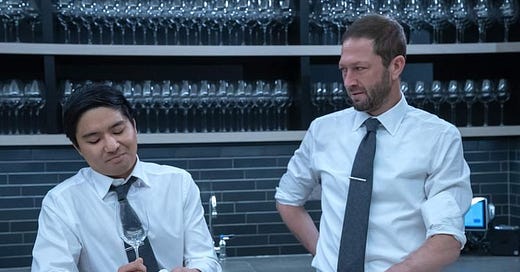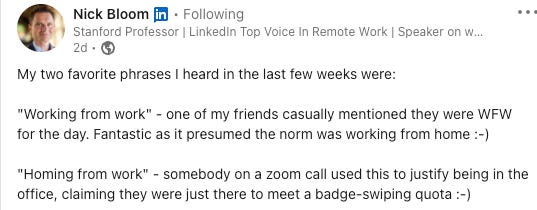How a shared identity was the foundation of Gareth Southgate's team's success
ALSO: we won! Brits are the least work focussed people in the world
Great culture is about the sustained pursuit of excellence
I know you’re a sophisticated person, so I’ve taken it as given that you’ve finished the second series of The Bear (Disney+) but if you haven’t I want to strongly urge you to check out episode 7. The episode focuses on Richie, the antagonist of the piece. The irascible and unlikeable cousin of Carmy, Richie has been a toxic irritant buzzing around seemingly intent on disrupting the arc of the story since the off. Richie simultaneously represents the fearful pull of the past and a wary voice mocking our desire to dream.
I read something beautiful by Rebecca Solnit a few years ago (that I’ve struggled to find right now) about the historic role of sitcoms in sustaining social norms. The classic situation comedy going back to the 1960s worked on the basis that each time we joined the characters (who were generally bound together in an unlikely and uncomfortable connection by ‘a trap’, like a shared relationship, workplace or location) they are unchanged. While they might profess to learn something at the end of episodes, when we next rejoin them their situation is the same.
Despite this, the storylines that a sitcom might throw up often demonstrated a character’s desire to escape the Mobius strip of their lives. Protagonists might dream up a get rich scheme, buy some fancy new clothes or seek to get a date. Their desire to break-free often gave rein to 20 minutes of ridicule, but we always ended up back at the start. Ridicule and laughter taught us that someone seeking to improve or to confront the injustice of their situation was conceited, vain and destined for failure. In The Bear, Richie represents the evolved version of this force, he is the gravitation pull of cynicism. We daren’t dream because we’d surely fail, ending up defeated and humiliated.
In episode 7 (‘Forks’) that all changes. If you’re ever in doubt that good cultures have at their heart a pursuit of excellence then this episode shows someone reaching that realisation. It is special television. (I’ll say no more for fear of delivering spoilers).
All of the above came to mind when I spoke to this week’s guest on the podcast. Owen Eastwood is a performance coach to a dazzling array of talent from Gareth Southgate’s England team and the England women’s team, to the senior leadership team of NATO. His former clients represent an elite range of teams who have gone on to achieve incredible victories. I wanted to understand how he did it.
What did he say? What did he ask?
What I learned was that Owen was able to tell a moving story about discovering his own lineage. When his father died, he had no connection to his Maori relatives. He reached out to them in an attempt to navigate his way to understanding himself. Their reply simply said to him, ‘you are Maori, you belong’.
The brief letter welcomed him as part of a line of succession. It helped him realise that as insignificant as he was in the context of history, merely one person in a long line of ancestors, he should feel the warmth of their kinship. That epiphany was a vital part in recognising what he should aspire to be, a journey out of ego and into the joy of collective achievement.
Eastwood’s approach is consistent. By zooming out and pointing our fleeting contribution to legacy he urges teams to think about their ‘Us’ story. For me this suggests that what he’s actually doing is emphasising a powerful shared identity. In my mind I would see this as activating a visceral bond of community, he chooses to label this as ‘belonging’. That distinction ends up feeling semantic when presented with what his approach achieves.
This week on the podcast I’m joined by new co-hosts Ellen Scott and Matthew Cook as we talk to Owen and debate purpose, identity and belonging.
It’s a truly brilliant listen - I hope you can check it out.
Listen: website / Apple / Spotify
Brits are the least likely to say that work is important to them - less likely than all of the other 23 countries in the survey (we’re also most likely to ascribe success in life to luck rather than hard work)
I really enjoyed this piece by Tim Harford about productivity (which pays credit to Oliver Burkeman along the way): ‘David Allen has pointed out that if, by some miracle, you were able to tick off everything on your to-do list tonight, by tomorrow afternoon you’d be fizzing with energy and ideas. The to-do list is not finished until you are. Learn to live in peace with that fact’.
Go back and listen: Oliver Burkeman on Eat Sleep Work Repeat
Not coming in three days a week? It’s probably not going to work out for you says Amazon boss
Google’s new Duet tool will attend a meeting on your behalf and send you a summary of what happened (available now it is claimed on their website)
I mention it on the podcast but please make sure you check out Joe Lycett’s special on Channel 4 last week (this badge below encapsulates the magical message of the show)
WeWork's feeble plight is set to force commercial property values even lower. WeWork is the 2nd biggest shared space provider in the US (behind Regus) and in the UK has been selling off the offices that it bought while seeking to renegotiate others. Prices are only going one way in this market.







